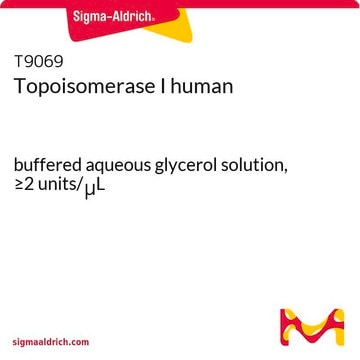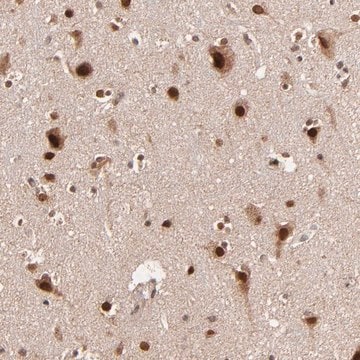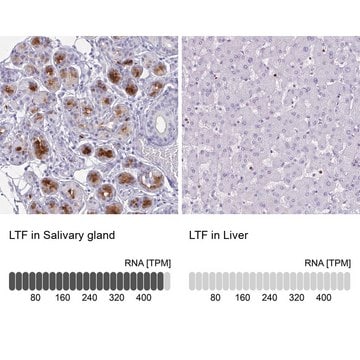T9194
Topoisomerase I from vaccinia virus
buffered aqueous glycerol solution
Synonym(s):
TOPO® I
Sign Into View Organizational & Contract Pricing
All Photos(1)
About This Item
CAS Number:
MDL number:
UNSPSC Code:
12352200
Recommended Products
biological source
vaccinia virus
form
buffered aqueous glycerol solution
mol wt
32 kDa
application(s)
genomic analysis
shipped in
wet ice
storage temp.
−20°C
Application
Topoisomerase I from vaccinia virus can be used for studying pivotal biological process such as-replication, transcription, recombination as well as DNA structure and topology which includes chromatin reconstitution in vitro and the degree of supercoiling of DNA. Additionally, the product helps in relaxing the DNA coils and exposes the restriction sites which facilitates in enhancing the restriction endonuclease digestion of resistant DNA. It is also used for assaying mutant plasmids which differ in length by only one base-pair.
Enzyme activity is increased in the presence of 2.5 mM Mg2+.
Biochem/physiol Actions
Topoisomerase I from vaccinia virus also refers as TOPO ®I is a type I DNA topoisomerase, which cleaves DNA at the preferred sequence [5′(C/T)CCTTI]. The product assists in releasing the supercoiling and torsional tension of DNA by cleaving and religating the phosphodiester bonds in a single strand of DNA.
Topoisomerase I relaxes supercoiled DNA molecules. The enzyme initiates transient breakages and rejoins of phosphodiester bonds in superhelical turns of closed-circular DNA. Enzyme activity is independent of right- and left-handed superhelices.
Unit Definition
One unit coverts 1 μg of supercoiled closed circular (Form I) pUC19 DNA to relaxed closed circular form (Form II) in 1 hr at 37 °C.
Physical form
Solution in 50 mM Tris HCl, pH 7.5, containing 100 mM NaCl, 1 mM EDTA, 1 mM DTT, 0.1% Triton X-100, and 50% glycerol.
Legal Information
TOPO is a registered trademark of Life Technologies
Storage Class Code
10 - Combustible liquids
WGK
WGK 2
Flash Point(F)
Not applicable
Flash Point(C)
Not applicable
Certificates of Analysis (COA)
Search for Certificates of Analysis (COA) by entering the products Lot/Batch Number. Lot and Batch Numbers can be found on a product’s label following the words ‘Lot’ or ‘Batch’.
Already Own This Product?
Find documentation for the products that you have recently purchased in the Document Library.
Rajesh Nagarajan et al.
Biochemistry, 45(18), 5775-5782 (2006-05-04)
Vaccinia DNA topoisomerase (vTopo) is a prototypic eukaryotic type I topoisomerase that shows high specificity for nucleophilic substitution at a single phosphodiester linkage in the pentapyrimidine recognition sequence 5'-(C/T)+5 C+4 C+3 T+2 T+1 p / N(-1). This reaction involves reversible
Analysis of topoisomerase-DNA interactions by electrophoretic mobility shift assay.
S Shuman
Methods in molecular biology (Clifton, N.J.), 95, 65-74 (2000-11-23)
B O Krogh et al.
The Journal of biological chemistry, 276(24), 20907-20912 (2001-06-16)
Vaccinia topoisomerase forms a covalent DNA-(3'-phosphotyrosyl)-enzyme intermediate at a pentapyrimidine target site 5'-CCCTTp downward arrow in duplex DNA. By introducing single 2'-5' phosphodiesters in lieu of a standard 3'-5' phosphodiester linkage, we illuminate the contributions of phosphodiester connectivity to DNA
C Cheng et al.
Nucleic acids research, 28(9), 1893-1898 (2000-04-11)
The specificity of vaccinia topoisomerase for transesterification to DNA at the sequence 5'-CCCTT and its versatility in strand transfer have illuminated the recombinogenic properties of type IB topoisomerases and spawned topoisomerase-based strategies for DNA cloning. Here we characterize a pathway
Mary R Stahley et al.
Biochemistry, 49(13), 2786-2795 (2010-03-02)
The type I DNA topoisomerase from vaccinia virus (vTopo) forms a reversible covalent 3'-phosphotyrosyl linkage with a single strand of duplex DNA at the preferred sequence 5'-(C/T)CCTTp downward arrowN(-1)N(-2)N(-3)-3'. The enzyme-DNA covalent adduct is recombinogenic in cells, because the nicked
Our team of scientists has experience in all areas of research including Life Science, Material Science, Chemical Synthesis, Chromatography, Analytical and many others.
Contact Technical Service








